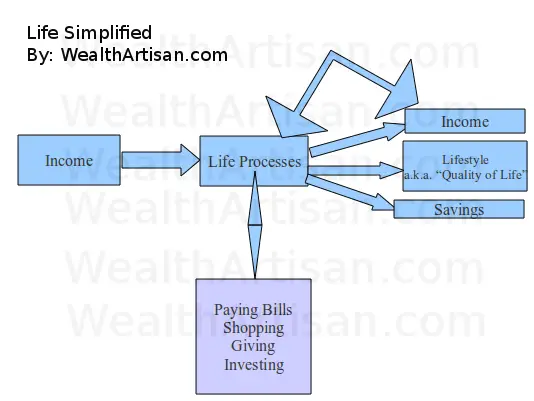This is an extremely simplistic view of your financial lifestyle. If you’re anything like me, then seeing things boiled down to their simplest terms is the best way to look at subjects. Most complex topics are built off of simpler ideas. An example is how computers operate off of an organized system of 1’s and 0’s.

Your Life In A Box
Your finances can be more simply boiled down to an income stream (or multiple streams if you have diversified income) that makes financial decisions with certain end results. Looking at the above chart I made for you, this is clearly seen. Your income stream goes into your “Life” process and a bunch of things happen. What are some things that happen?
- Your mortgage gets paid.
- You pay your electric, water, cable, phone, internet, and insurance bills.
- You buy some food and a new winter coat because it is snowing outside.
- You give some money to a church or local charity.
- You put some money into your Roth IRA, or TFSA (Cheers, Kevin!).
- You buy some dividend paying stocks.
- And, you put a little into savings.
There are a lot of other things that can happen during this “Life” process, and these are the things that define your life. These are the things that make your life different from your neighbors, or my life different from yours. By passing your income through this “Life” process, you transform your income into outputs. These outputs are your lifestyle (or quality of life), hopefully some more income, and savings.
Please Note: Generally, quality of life is inversely related to the other two outputs. That means that a higher quality of life usually means less savings and less income generated from your income. There can be many more output possibilities but most can crudely be lumped into one of these categories.
The Good News About Your Life Process
The good news in all of this is that you have a whole lot of control on what happens in that “life” box, which directly affects the outputs. You also have a little control over that first income box too. Many people might argue this, but you have complete control your phone bill, cable bill, etc. We will discuss this a bit more in the next section. Please Note: The income output has an arrow that points back into the life box. This is another example of how you can control your income.
The Bad News
Of course, with good news, there is bad news. Most people exhibit very little control over their life process, and use the word “cannot.” Some might say that they can’t live without cable, or cell phones, etc. Will controlling those processes lower your “quality of life” output? Absolutely, but it will also increase your “savings” or “income” outputs. For some people, this is a worthwhile trade-off, but others don’t want to lower that quality of life output.
Ironically, by lowering your quality of life, you can actually increase your income by investing properly and end up having an even better quality of life. The trade-off is that it takes a bit of time and pain. No one ever said it would be easy, but taking a more macro look at your life might help you get your processes into better control. Leave us a comment, subscribe to our feed, and be sure to keep checking back! What processes are you taking control over, do you lower your quality of life to increase your other outputs?